C & S Plymouth

Beez Neez now Chy Whella
Big Bear and Pepe Millard
Thu 12 Jul 2018 22:57
|
The Scotties to Plymouth –
Where They Left From
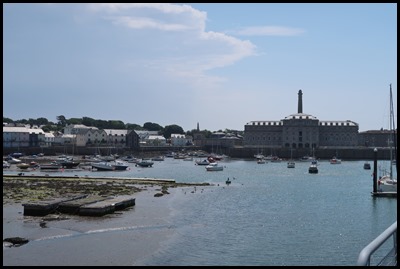 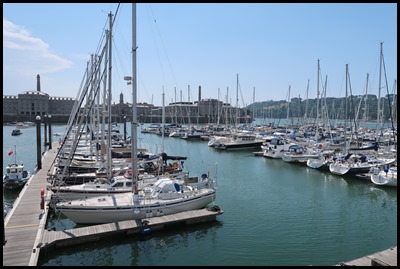 After breakfast a plan formed, we
headed to Mayflower Marina........
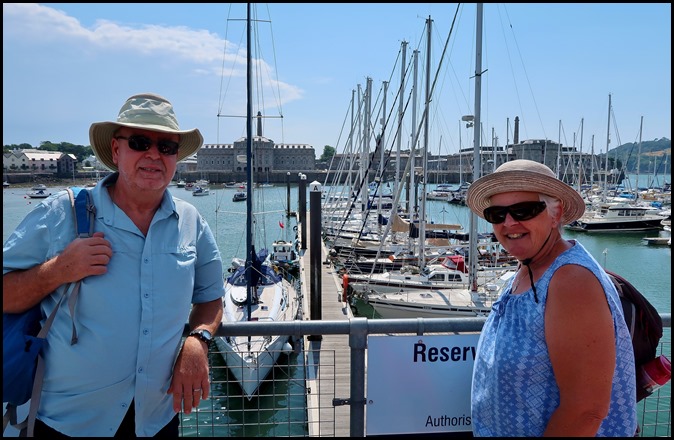 ........for Chris
and Steve to stand right over the spot that they left on their
Scott-Free in 2008.
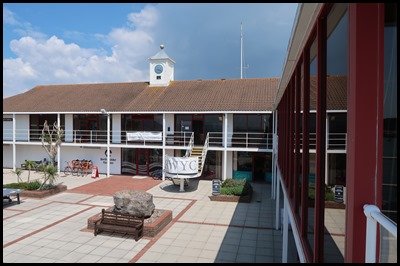 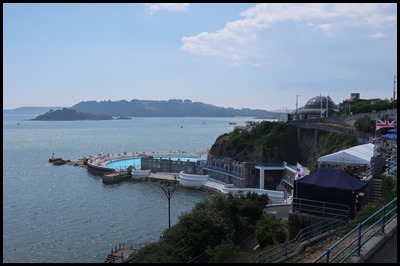 We plan to go to Fowey on the morrow
to show The Scotties where we left from. Our next stop was to bimble around the
Royal Western Yacht Club, we had an interesting chat
with a yacht broker who amazingly knew Scott-Free and our first girl
Razzmatazz. Lunch in the bistro below the broker and then off toward
The Hoe for a bimble and an ice cream.
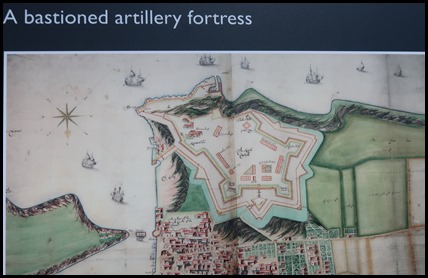 We parked and walked past an
information board we have never seen before. Construction of the Royal Citadel, designed by King Charles II’s (r. 1660-85)
engineer Sir Bernard de Gomme, began in 1665 during the Second Anglo-Dutch War.
Its guns and garrison protected the seaward approach to naval anchorages at
Sutton Pool and the Cattewater but also guarded against a landward attack. Its
ornate main gate is a notable work in the Baroque style.
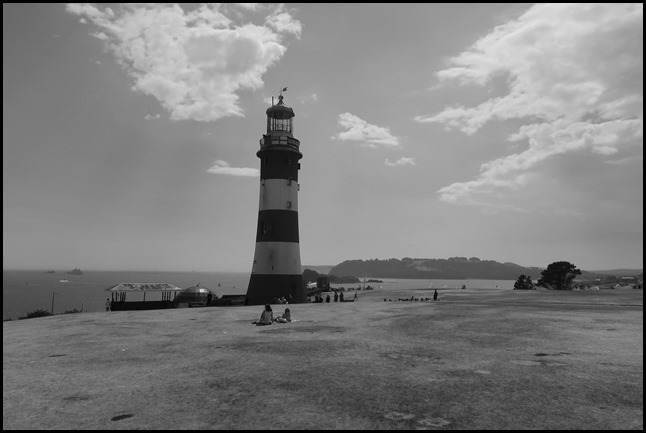 Up on The Hoe,
looking left at the famous, iconic emblem of the city, Smeaton’s Tower, now standing as a memorial to John
Smeaton. This was the third Eddystone Lighthouse. Built in 1759 it was
originally lit by twenty four candles weighing between two and four pounds. It
served until 1877 when erosion forced the building of a new lighthouse and
finally went dark in 1879. The old base still stands next to the current
Eddystone Lighthouse. The tower was dismantled and has stood proudly here ever
since. Gaining a Grade 1 Listing in 1954, visitors can climb the ninety three
steps to the top.
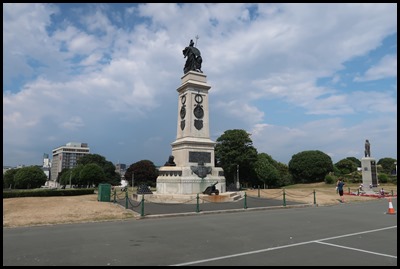 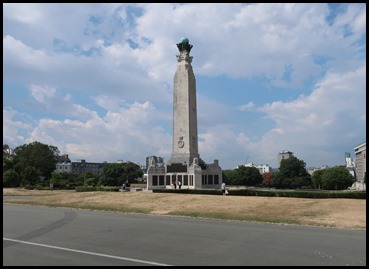 Looking right to the War Memorials.
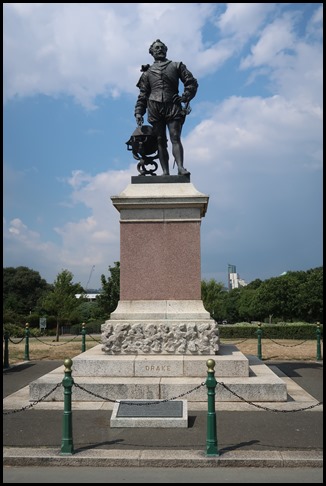 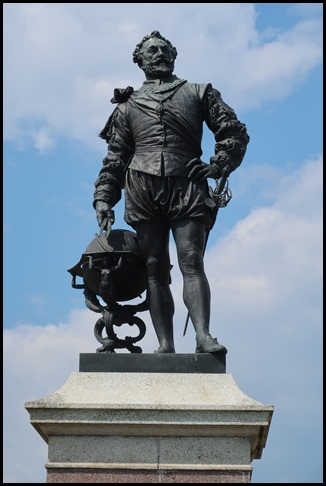 0
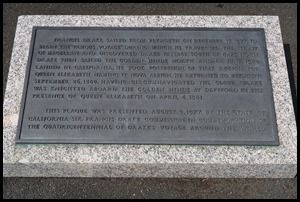 Further to the left stands Francis Drake looking out to sea. Francis Drake
sailed from Plymouth on December 13, 1577, to begin the “famous voyage” during
which he traversed the Strait of Magellan and discovered Drake Passage south of
Cape Horn. Drake then sailed the Golden Hinde north and in June 1579
landed in California; he took possession of that region for Queen Elizabeth
naming it Nova Albion. He returned to Plymouth September 26, 1580, having
circumnavigated the globe. Drake was knighted aboard the Golden Hinde
at Deptford in the presence of Queen Elizabeth on April 4,
1581.
This plaque was presented August
5, 1977, by the State of California Sir Francis Drake Commission in
commemoration of the Quadricentennial of Drake’s voyage around the
world.
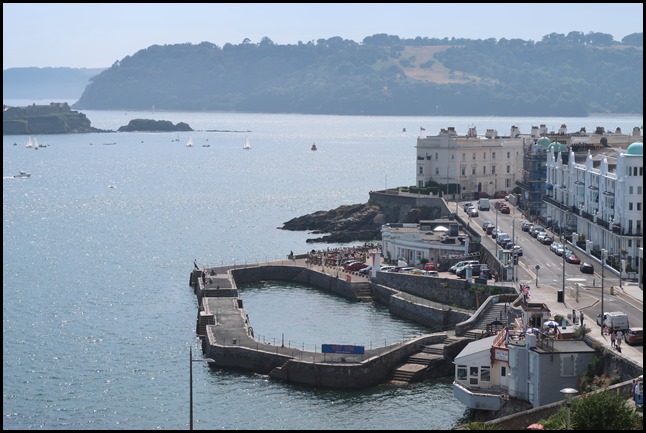 Looking down on the Wet Wok Chinese Restaurant (bottom right), it’s blue neon
light was our beacon when we returned after dark. Only once did we get back at
three in the morning, bereft no light – we had to be grown up and use the
‘proper’ light markers........
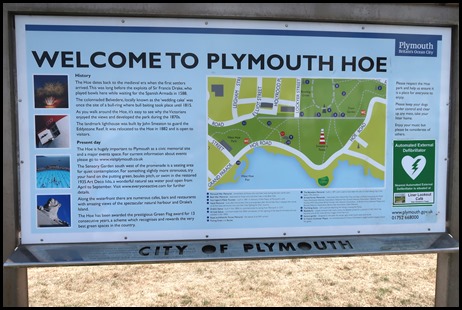 Another information board, new
to us reads: History: The Hoe dates back to the medieval era when the
first settlers arrived. This was long before the exploits of Sir Francis Drake,
who played bowls here while waiting for the Spanish Armada in
1588.
The colonnaded Belvedere, locally
known as the ‘wedding cake’ was once the site of a bull-ring where bull baiting
took place until 1815.
As you walk around the Hoe, it’s
easy to see why the Victorians enjoyed the views and developed the park during
the 1870s.
The landmark lighthouse was built
by John Smeaton to guard the Eddystone Reef. It was relocated to the Hoe in 1882
and is open to visitors.
Present Day: The Hoe is hugely
important to Plymouth as a civic memorial site and a major events space. For
current information about events please go to www.visitplymouth.co.uk
The Sensory Garden south west of
the promenade is a seating area for quiet contemplation. For something slightly
more strenuous, try your hand on the putting green, boules pitch, or swim in the
restored 1935 Art Deco lido, a wonderful natural sea water pool open from April
to September. Visit www.everyoneactive.com for further
detail.
Along the waterfront there are
numerous cafes, bars and restaurants with amazing views of the spectacular
natural harbour and Drake’s Island.
The Hoe has been awarded the
prestigious Green Flag award for 13 consecutive years, a scheme which recognises
and rewards the very best green spaces in the country.
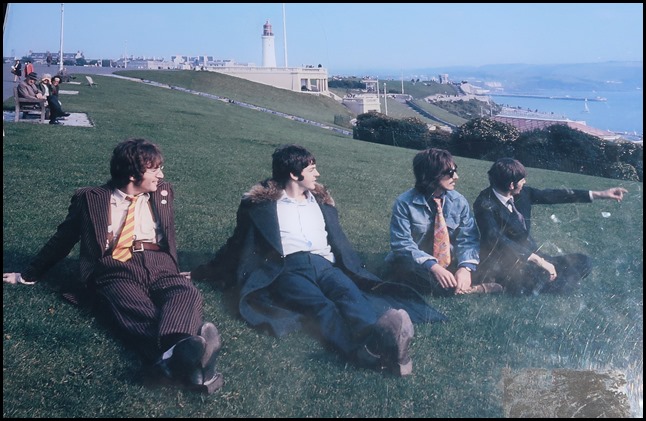 At the far end of our bimble was
a very famous picture with information: This
artwork marks the spot where John, Paul, George and Ringo posed for a picture
that has gone on to become one of the most famous images of one of the world’s
most influential bands.
Taken on Tuesday 12 September
1967 by music photographer David Redfern, it shows ‘The Fab Four’ with an
all-white Smeaton’s Tower in the background. They were in the city to pose for
photographers while making ‘The Magical Mystery Tour’ film.
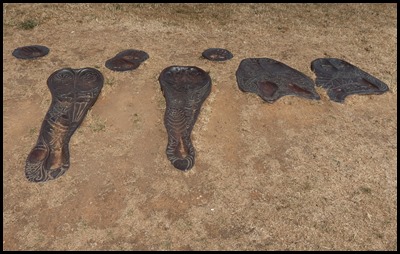 Fans can recreate this image by
sitting on the copper bottom moulds made by Thrussell
and Thrussell. The artists were assisted by tribute band The Fab Beatles whose
bottoms were used to create the moulds!
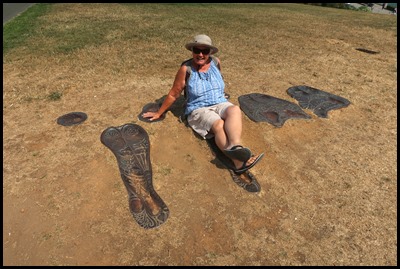 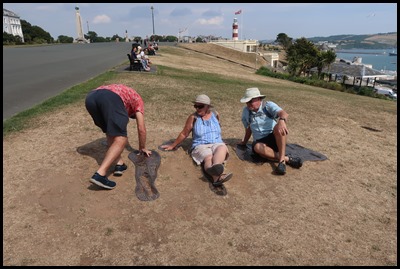 Nothing for it but to gather Our Fab
Four........Maj (short for Majesty) was first in
position, Steve leapt to the task and as Bear was going
down like an elderly, creaky tree, I went to summon an unsuspecting
photographer.
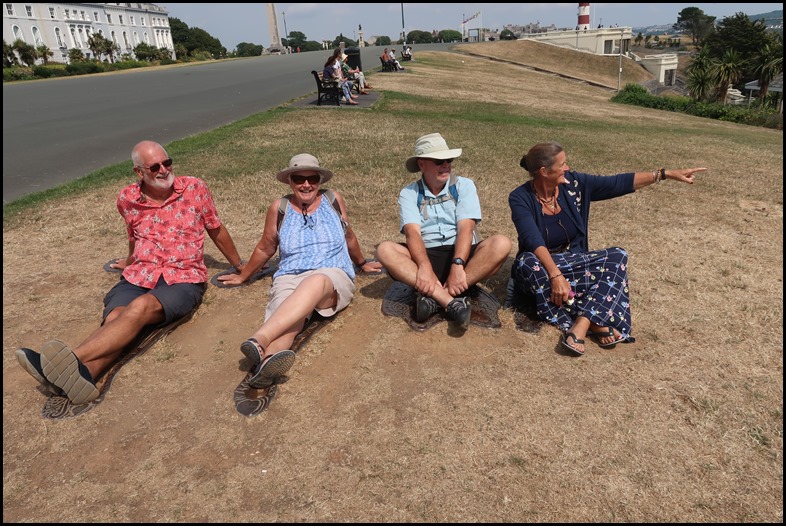 We did really well as Our Fab Four but our photographer chopped off Smeaton’s
Tower at the knee............
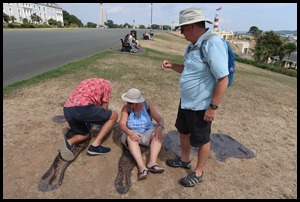 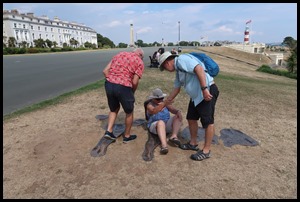 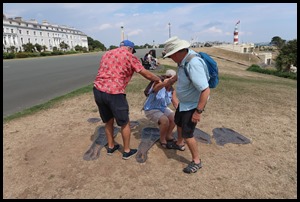 The reverse of the
process caused as many giggles............
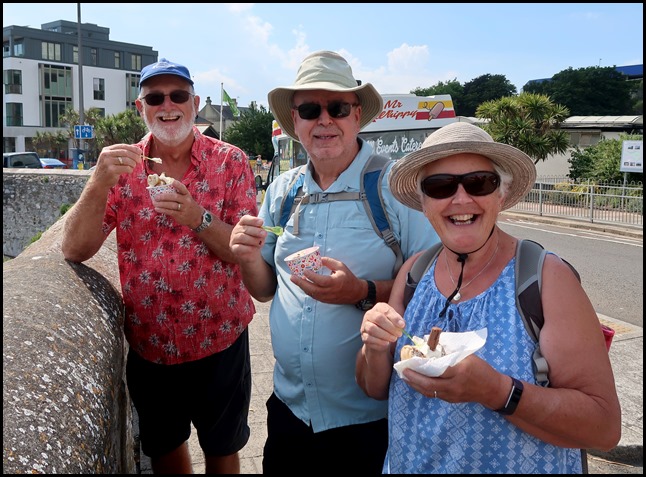 ............definitely ice cream time.
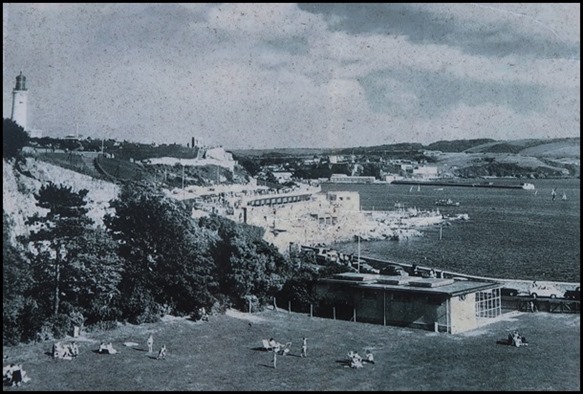 I nipped back over the road as I
saw yet another new information board – well, new to
us (might have been there a while in fairness but we haven’t – considering this
is our home town.....). Welcome to West Hoe Park
with its fantastic views of the city and Plymouth Sound.........As you walk
around the park you can appreciate why the Victorians liked the views so much
that during the 1900’s they turned this quarry into a glorious park with
magnificent views. On a clear day you can see Mount Batten and Jennycliffe and
the boats in Plymouth Sound framed by Plymouth Breakwater.
Elsewhere in the park the cliff
face is excellent for bats and roosting birds and helps maintain a local micro
climate that gives the park a subtropical feel..........
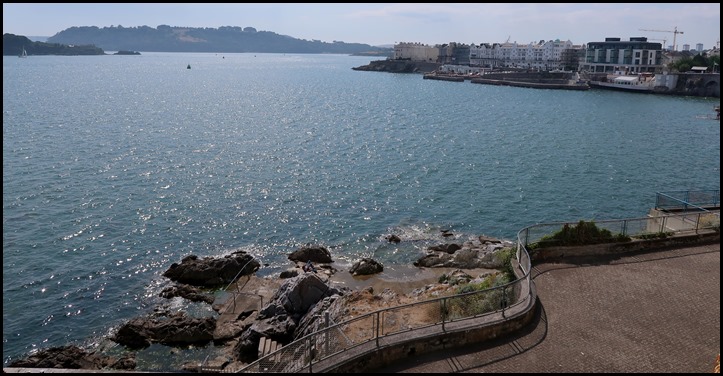 Walking back toward the car we took
in the view.
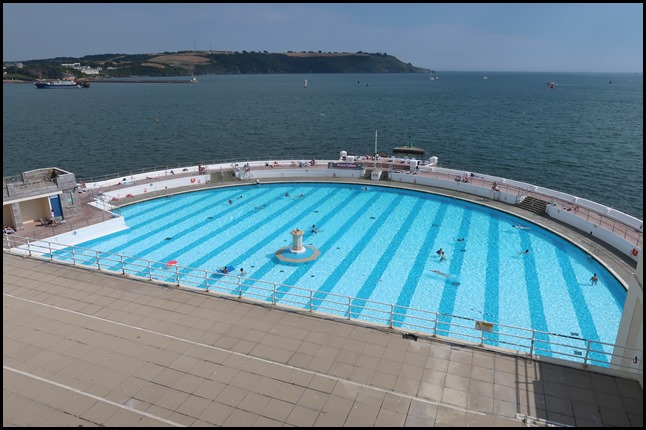 Nice to see people having the
sunshine to enjoy Tinside Lido is now fully
restored to its former art deco glory, but with all the facilities you would
expect of a modern swimming pool. There is a large outdoor salt water pool and a
sun bathing terrace. Refreshments are available and picnics are
allowed.
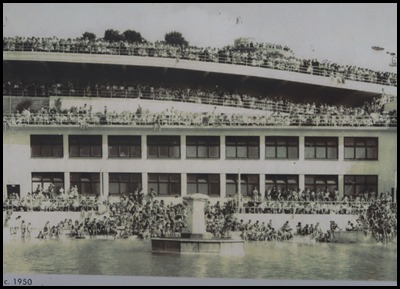 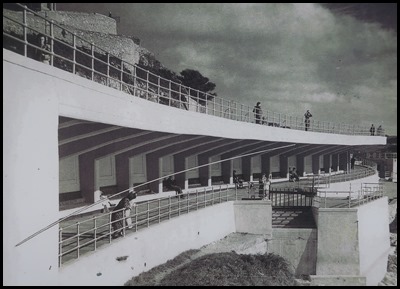 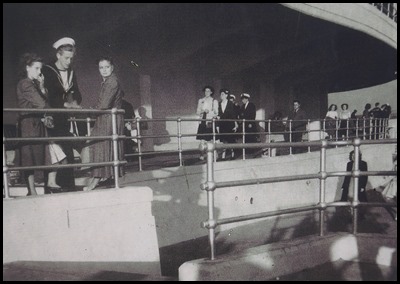 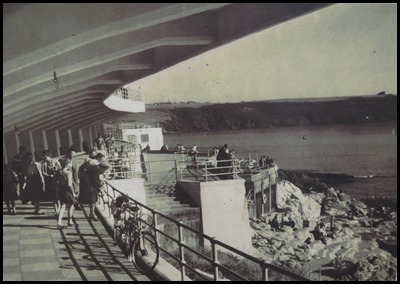 Pictures from the
1950s of Tinside Lido.
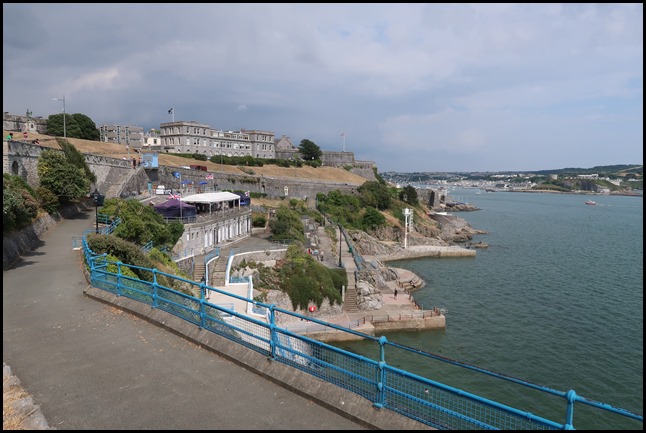 Final look
before heading back to Eva.
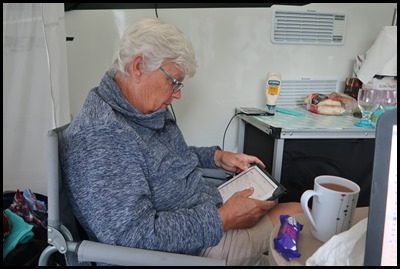 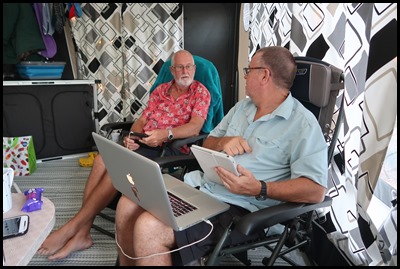 After supper
Maj and I got stuck in to some much needed research whilst Bear took a lesson in mapping from Steve.
ALL IN ALL A SMASHING DAY
OUT
A GREAT DAY
OUT |